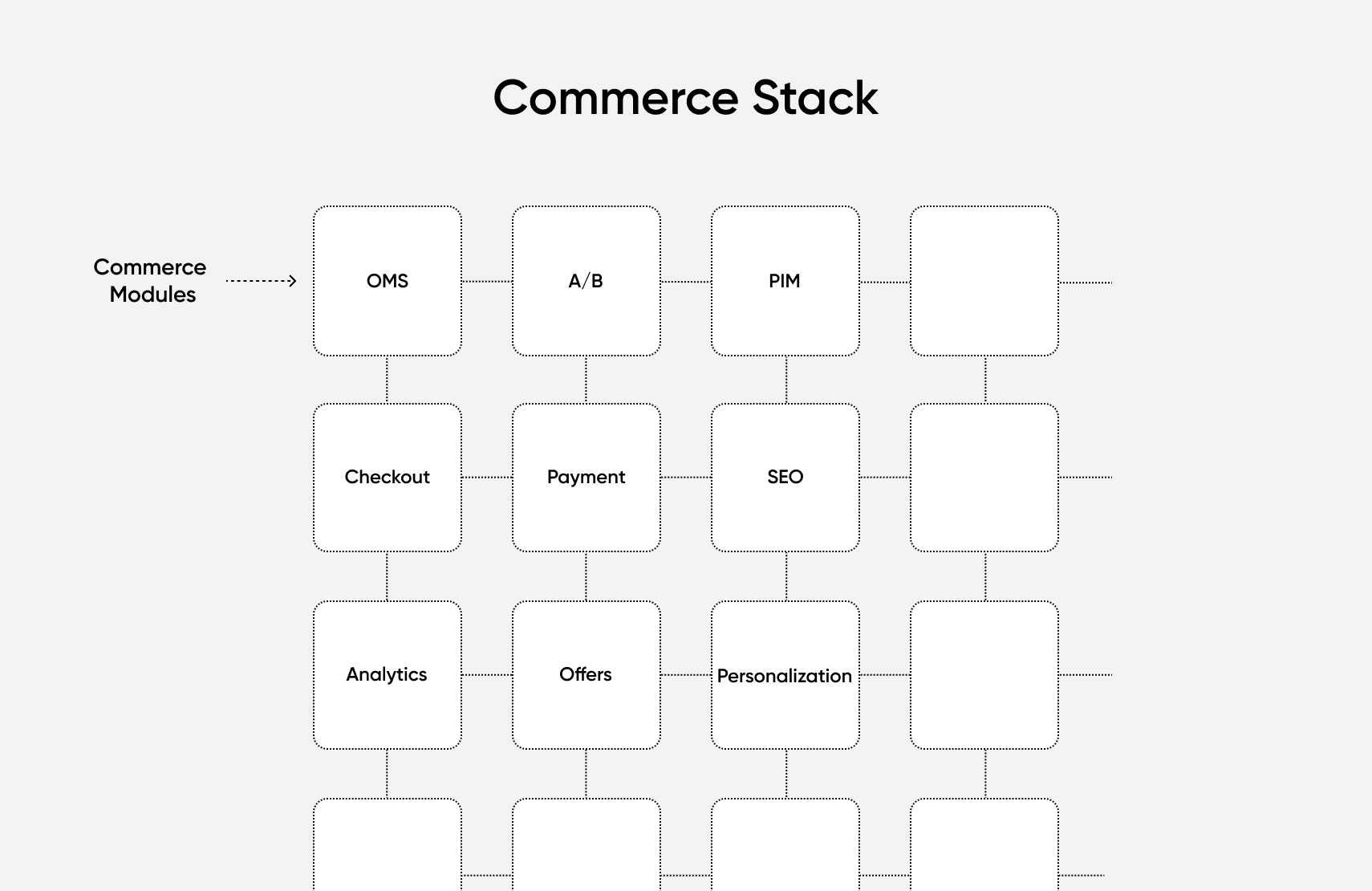What Is Modular Commerce?

Modular commerce allows you to build a fully-customized, best-in-breed commerce platform for your business.
Commerce modules collectively comprise a commerce stack that works with your CMS in a flexible headless architecture.
The use of commerce modules allows marketers to publish content across a variety of channels without needing to involve developers.
The modular approach allows you to add new features to your platform using existing modules without disruption.
[toc-embed headline=”Modular Commerce Definition”]
Modular Commerce Definition
Modular commerce involves building the functions of a commerce platform from a set of interconnected components rather than using a pre-packaged system so that retailers can scale commerce more efficiently.
[toc-embed headline=”Overview of Modular Commerce”]
Overview of Modular Commerce
Many growing retailers focusing on e-commerce have a custom-built commerce platform with some support through a traditional content management system (CMS) like WordPress. But now they are moving towards a modular setup to more easily update and publish content across a variety of channels (i.e. omnichannel).
With modular commerce, modules are integrated in the backend of a commerce platform to deliver content to various channels. They handle different functions within the buyer’s journey to deliver a seamless customer experience. While traditional systems require developers to make changes to the platform for marketers to introduce new types of content, modular platforms give marketers more control over the content element.
Unlike a traditional commerce platform, a modular commerce platform gives businesses the flexibility to fully customize their platforms with the best available tools. As each building block operates independently, developers can implement incremental updates and changes to evolve the backend systems without requiring a large release or platform migration.
[toc-embed headline=”How Modular Commerce Works”]
How Modular Commerce Works
A modular architecture in the backend of a commerce platform is constructed of commerce modules that collectively form a commerce tech stack. Commerce modules are software services, databases, or pieces of code that handle administrative functions which power the product sales process.
Some modules in a modular commerce architecture include:
- A/B testing
- Product information management
- Personalization engines
- Order management
- Checkout
- Payment processing
- Offers engines
- Analytics
- SEO tools
Each module operates independently but can transfer data to the other modules and the storefront with the use of Application Programming Interfaces (APIs). When commerce modules are paired with a headless content management system (CMS), marketers can use the full capabilities of the commerce stack in an intuitive way without any help from developers.
The CMS simply pulls data from the modules and feeds it into customized content via APIs. For example, a retailer could use traffic analytics to personalize recommendations for shoppers on different channels based on products they have viewed recently, and offer discounts to encourage them to complete purchases.
This allows developers to focus on the operation of the commerce engine while marketers can work independently on content creation, promo planning, and experiments.
Modular commerce and omnichannel
With the commerce stack feeding data into frontend touchpoints, retailers can create personalized content for delivery to various channels regardless of their operating system—including iOS and Android devices, wearable technology, and connected home devices.
In addition to this, modular commerce offers these benefits:
- Building a platform with specific modules helps businesses become more agile.
- Developers can select and update the functionalities that make the most sense for the channels they operate.
- Modules are scalable, allowing developers to add modules as the business grows and expands into new channels.
- Retailers can quickly react to changes in customer behavior.
[toc-embed headline=”Example of Modular Commerce”]
Example of Modular Commerce
Avis Budget Group, a global provider of vehicle rental services has adopted a modular commerce architecture for its brands that operate in approximately 175 countries with more than 10,000 rental locations.
Following several acquisitions, the Avis group includes the Budget, Zipcar, and Payless brands, each targeting separate consumer market segments. The modular approach allowed the company to implement new features using existing modules and migrate to a new content management system without disruption to the customer experience.
Using a centralized commerce stack, the Avis group’s platform allows it to customize content and design to the needs of its individual brands, markets, and channels. The company launched new websites that distinguish between brands and incorporate interactive features to enhance the vehicle reservation process. It also launched new channels including a mobile car rental app that was ranked highest in customer satisfaction in the J.D. Power Awards 2019.
Tech advocate and writer @ fabric.
